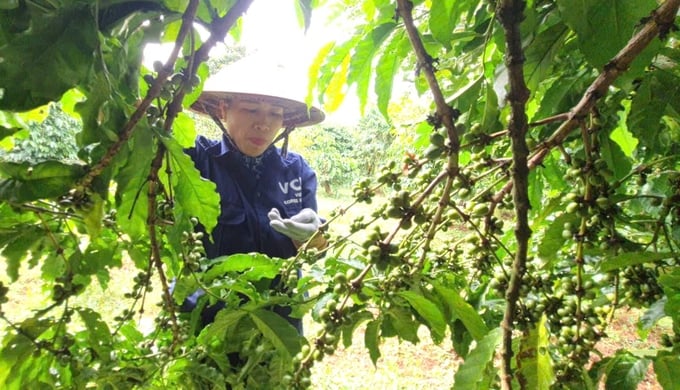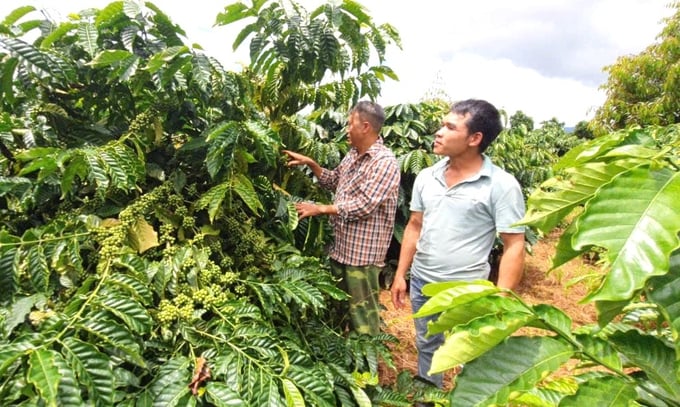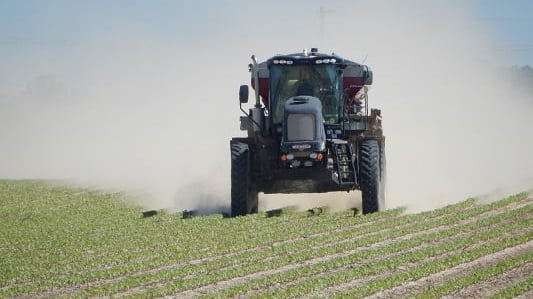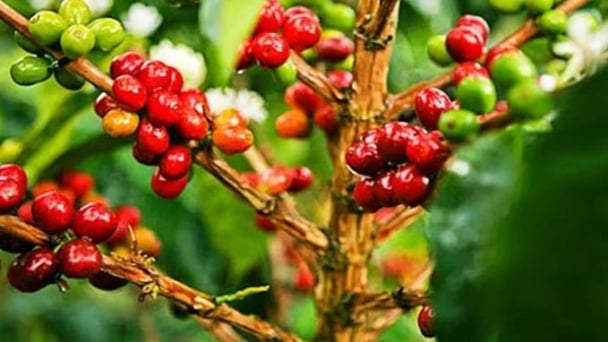June 24, 2025 | 22:43 GMT +7
June 24, 2025 | 22:43 GMT +7
Hotline: 0913.378.918
June 24, 2025 | 22:43 GMT +7
Hotline: 0913.378.918
In Tan An village, located in Ia Sao commune – one of the areas with the largest coffee plantations in Ia Grai district (Gia Lai province), the family of Mr. Nguyen Nghiem owns a 3-hectare coffee farm. Mr. Nghiem is one of the pioneering farm owners in the coffee-growing hub of Ia Sao who has embraced organic and sustainable coffee farming practices.

Checking the ripeness of coffee beans before harvest in Chu Se district. Photo: Dang Lam.
According to Mr. Nguyen Nghiem, his coffee farm has rarely experienced a poor harvest, and even in years when the prices hit rock bottom, he has never suffered losses due to the high yield, which compensates for the price drop. Although the harvest has just begun this year, he confidently states, "The yield on my family’s coffee farm this year will be no less than 4.5 tons of beans per hectare".
With 3 hectares of coffee (including 400 trees for him and his wife, with the remainder divided between their son and daughter), this year, he has hired 10 workers for the harvest, and he expects the work to be completed in about a month. Regarding the labor arrangements, Mr. Nghiem explained that instead of hiring workers on a daily basis, this year, he has agreed to a piece-rate payment system. "For every 1 quintal of coffee cherries harvested, I will pay the workers 4.5 USD. The farm provides accommodation, electricity, and water, and fresh vegetables are readily available in the garden. Occasionally, I also offer them some meat and a bottle of rice wine to relieve their fatigue", Mr. Nghiem added.
Two brothers, K'pah Mok and K'pah Net (from the J'rai ethnic group), are from the remote Chu D'rang commune in Krong Pa district. They traveled over 150 kilometers to the Ia Sao area to pick coffee for hire. Mok shared that he usually manages to pick around 4 quintals of coffee cherries each day. On days when he feels strong, especially when working in a flat coffee garden, he can harvest up to 5 quintals, which translates into a daily wage of around 22 USD.
"The host is very generous and always looks out for us", Mok said with a smile. "In addition to paying us a fair and timely wage at the end of each day, he occasionally gives us extra meat and good wine, so we can relax and enjoy a few drinks to warm ourselves up after a hard day's work".
This year, the coffee garden of over 1 hectare belonging to Mrs. Le Thi Ngan’s family in Ia Kha town (Ia Grai district) has had a good harvest. Anh Ba and Anh Trong from Binh Dinh are the workers whom Mrs. Ngan has hired to pick coffee every year. This time, the two men have set up a shelter right in the coffee garden for convenience. Mrs. Ngan also supports their food and transportation costs. The wage is 14 USD/day/person, with the condition that each worker must pick at least 1.8 quintals of coffee cherries per day; otherwise, they will be paid on a fixed contract rate. Having experience in manual labor, by the end of the harvest (which usually lasts about two weeks), each of them will bring home a decent sum of money.
Mrs. Ngan shared: "This year, the coffee crop is both abundant and well-priced, so not just me but almost all the other garden owners are generous with their workers. In addition to paying fair wages, my family always takes care of the workers' food, accommodation and transportation".
Ia Grai district has over 18.000 hectares of coffee, with more than 17.000 hectares currently in harvest. This year, the coffee crop is not only abundant but also well-priced, which has left the local farmers feeling optimistic and excited. Right from the start of the season, garden owners in the region have been trying to contact their regular workers - those who have helped them in previous harvest seasons.
At the beginning of the harvest, when the coffee beans were not yet fully ripe, anh Nguyen Nghiem in Ia Sao only hired the brothers K’pah Mok and K’pah Net. "Once we enter the main harvest period, our family will hire 10 workers to help with the coffee picking", anh Nghiem said.
However, one concern this year is that the harvest season has already been affected by several bouts of rain, which can make picking difficult. When ripe coffee beans are exposed to rain, they tend to swell open, resembling flowers. "When it rains, the beans that don’t burst open will fall to the ground. At that point, we have to go under the coffee plants and pick up each fallen bean one by one. While this doesn’t affect the quality of the coffee beans, it is a very time-consuming and labor-intensive process", anh Nghiem explained.

The organic coffee garden of farmers in Chu Pah district (Gia Lai). Photo: Dang Lam.
In the entire Ia Grai district, with over 18.000 hectares of coffee, the coffee plantations of businesses located in the area account for around 5.000 hectares, while the remaining 13.000 hectares belong to smallholder farmers. The biggest concern for coffee garden owners here is the weather, especially rain, as it can severely affect the harvest progress. If there aren't enough workers to pick the coffee, the fruits may fall to the ground when it rains.
Therefore, in addition to the good yield and favorable prices this year, coffee garden owners are also willing to hire labor at higher wages to encourage workers to harvest the coffee quickly. This will ensure that the coffee is dried and stored as soon as possible. "Finishing the harvest early also helps avoid the risk of coffee theft from the gardens. Because the coffee is priced well this year, incidents of coffee theft have also occurred in the area", Mrs. Ngan shared.
Mr. Phan Dinh Tham, Head of the Agriculture and Rural Development Department of Ia Grai district, shared that his department had recommended that the district government instruct relevant agencies to help farmers find labor for the coffee harvest. Additionally, they advised farmers to organize labor efficiently by having workers start with the gardens where the coffee ripens first, then move on to help with the next ones.
"Fortunately, many coffee garden owners have established relationships with workers from previous harvest seasons, so this year, before the harvest began, they had already reached out to these workers. These are laborers from neighboring districts where coffee is not grown. During the off-season, they come to pick coffee for extra income. In addition, there is also a large influx of workers from the coastal provinces in Central Vietnam and northern regions, who travel to Ia Grai to take up coffee-picking work", Mr. Tham explained.
This year, the coffee harvest is not only abundant but also well-priced. With the local authorities' support in securing labor for the harvest, the joy of coffee garden owners has been multiplied.
Mr. Phan Dinh Tham explained, "This year, with over 17.000 hectares of coffee ready for harvest and an estimated yield of about 15 tons of fresh coffee cherries per hectare, the total coffee production for the entire district is projected to exceed 250.000 tons of fresh cherries. To ensure that there is enough labor for the harvest, the district has actively assisted garden owners by helping them find labor sources. At the same time, we have increased efforts to protect the coffee gardens, preventing theft and branch cutting".
Translated by Phuong Linh

(VAN) Coffee prices on June 20, 2025, fluctuated, with Arabica plunging by 3%. Domestic coffee prices remained flat, trading at VND 103,000 – 103,500/kg.

(VAN) The vice president of fertilizer with Stone X Group says increasing tensions in the Middle East are impacting global nitrogen prices.

(VAN) Coffee prices on June 19, 2025 dropped globally. Domestic coffee prices dropped by as much as VND 2,300, plunging to around VND 107,100 - 107,700/kg.

(VAN) Coffee prices on June 18, 2025, declined globally, with Arabica losing about 2.3%. Domestic prices fell by VND 1,600, down to VND 109,400 – 110,000/kg.

(VAN) Japan will release another 200,000 metric tons of rice from its emergency stockpile to tackle a doubling of prices since last year, Agriculture Minister Shinjiro Koizumi said on Tuesday.

(VAN) Coffee prices on June 13 declined sharply for Arabica. Domestic coffee market in Vietnam dropped by VND 2,000, trading at VND 111,500 – 112,300/kg.

(VAN) Coffee prices on June 12, 2025, continued to fall. Domestically, coffee prices decreased by another VND 2,000, trading at VND 111,500 – 112,300/kg.